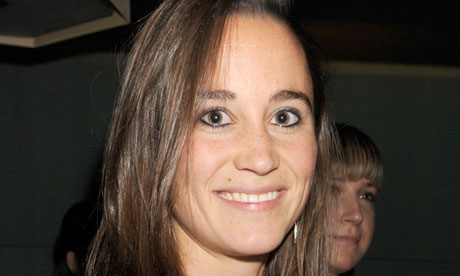Times are tough in the book trade. But some star-dusted projects can still apparently attract serious money
Alison Flood on her Guardian book blog.

Pippa Middleton: perfect publishing prospect? Photograph: Richard Young / Rex Features
Pippa Middleton, sister to Kate, party planner – and most recently, lucky recipient of a reported £400,000 book deal from Penguin's commercial imprint, Michael Joseph.
The title? How to Be the Perfect Party Hostess. "It will be about entertaining and how to throw the perfect party. It's not just about being the perfect hostess – it will also include recipes and information about how to host different types of events," the ubiquitous "friend" told the Daily Mail. "Pippa has been sketching out the chapters and has decided to start each one with an amusing anecdote."
Her qualifications? She's "a professional party planner for London-based events company Table Talk", and she "is also a talented writer and edits The Party Times, an online newsletter on her parents' Party Pieces website".
No wonder there was a "fierce bidding war by some of Britain's largest publishers" over her very first book.
Let's put that £400,000 in perspective. Julian Assange was reported to have been paid £500,000 by Canongate for his memoir. Two debut novelists landed deals of £500,000 or more this spring. Fourth Estate is believed to have paid more than £500,000 for UK rights in Jeffrey Eugenides's The Marriage Plot and a short story collection. House of Leaves author Mark Z Danielewski scored a reported million-dollar advance last week. But deals of this size are few and far between these days – these signings stand out precisely because such large payouts are so rare.
The rush to publish "celebrity" titles – and to shell out huge sums of money for them – began, I think, in 2004, when small independent press John Blake made a killing with Katie Price's Being Jordan. Suddenly everyone wanted to board the train – I was working for the Bookseller at the time, and it seemed there was a story every week about a celebrity landing a huge deal, about publishers duking it out for a memoir by Stephen Fry, or Keith Richards, or Roger Moore, or – ermm – fiction by Martine McCutcheon. After a while, as Pete from Big Brother was signed up, as Chantelle from Celebrity Big Brother scooped £300,000, I began to wonder who could possibly be left without a book deal. But, as sales of celebrity memoirs slumped, the trend appeared to be tailing off somewhat, the barrel to have been comprehensively scraped.
Yet the Middleton deal shows that even in these straitened times, publishers are still prepared to pay out huge advances if they really believe in a book. It's just a shame this is the book they believe in.
The title? How to Be the Perfect Party Hostess. "It will be about entertaining and how to throw the perfect party. It's not just about being the perfect hostess – it will also include recipes and information about how to host different types of events," the ubiquitous "friend" told the Daily Mail. "Pippa has been sketching out the chapters and has decided to start each one with an amusing anecdote."
Her qualifications? She's "a professional party planner for London-based events company Table Talk", and she "is also a talented writer and edits The Party Times, an online newsletter on her parents' Party Pieces website".
No wonder there was a "fierce bidding war by some of Britain's largest publishers" over her very first book.
Let's put that £400,000 in perspective. Julian Assange was reported to have been paid £500,000 by Canongate for his memoir. Two debut novelists landed deals of £500,000 or more this spring. Fourth Estate is believed to have paid more than £500,000 for UK rights in Jeffrey Eugenides's The Marriage Plot and a short story collection. House of Leaves author Mark Z Danielewski scored a reported million-dollar advance last week. But deals of this size are few and far between these days – these signings stand out precisely because such large payouts are so rare.
The rush to publish "celebrity" titles – and to shell out huge sums of money for them – began, I think, in 2004, when small independent press John Blake made a killing with Katie Price's Being Jordan. Suddenly everyone wanted to board the train – I was working for the Bookseller at the time, and it seemed there was a story every week about a celebrity landing a huge deal, about publishers duking it out for a memoir by Stephen Fry, or Keith Richards, or Roger Moore, or – ermm – fiction by Martine McCutcheon. After a while, as Pete from Big Brother was signed up, as Chantelle from Celebrity Big Brother scooped £300,000, I began to wonder who could possibly be left without a book deal. But, as sales of celebrity memoirs slumped, the trend appeared to be tailing off somewhat, the barrel to have been comprehensively scraped.
Yet the Middleton deal shows that even in these straitened times, publishers are still prepared to pay out huge advances if they really believe in a book. It's just a shame this is the book they believe in.
No comments:
Post a Comment